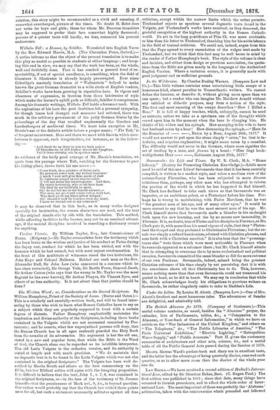The IVritten Word; or, Considerations on the Sacred Scriptures. By
William Humphrey, Priest of the Society of Jesus. (Burns and Oaths.)— This is a scholarly and carefully-written book, and will be found inter- esting by those who wish to learn what Roman Catholics have to say on a subject which they are popularly supposed to treat with a certain degree of distaste. Father Humphrey emphatically maintains the inspiration and divine authority of the Scriptures, including those books contained in the Vulgate which are not accounted canonical by Pro- testants; and he asserts, what few unprejudiced persons will deny, that the Roman Church has in all ages zealously guarded the Holy Book from the assaults of its adversaries. His argument is but the old one, stated in a new and popular form, that while the Bible is the Word of God, the Church alone can be regarded as its infallible interpreter. The old Latin Vulgate is the orthodox version, and its authority is stated at length and with much precision. "We do maintain that no dogmatic text is to ho found in the Latin Vulgate which was not also contained in the original Scriptures." The Vulgate has been well de- scribed by Martin Routh and others as the best commentary on the Bible, but few Biblical critics will agree with the foregoing proposition. It is difficult to believe that the text, John I., v. 7, 8, was contained in the original Scriptures, or—in the face of the testimony of St. Jerome himself—that the genuineness of Mark xvi., 9, &c., is beyond question. Our author would probably say that the Church has settled these points once for all, but such a statement necessarily militates against all free criticism, except within the narrow limits which the writer permits. Tischendorf rejects as spurious several dogmatic texts found in the Vulgate, yet Tischendorf's works have received, as they deserved, the grateful recognition of the highest authority in the Roman Catholic world. No act in the long pontificate of Pius lx. was more creditable to him than his letter to Tischendorf, thanking him for his noble labours in the field of textual criticism. We could not, indeed, argue from this that the Pope agreed to every emendation of the vulgar text made by- Tischendorf, but we think that this fact may be well borne in mind by the reader of Father Humphroy's book. The style of the volume is clear and incisive, and either from design or previous association, the quota- tions from the Bible are given nearly in the language of the Authorised English Version. Where a variation occurs, it is generally made with good judgment and on sufficient grounds.


































 Previous page
Previous page